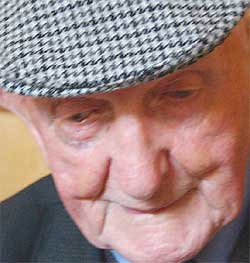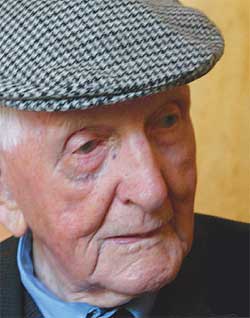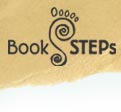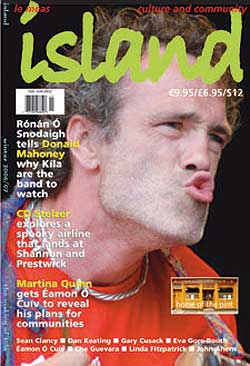|
|
Dan Keating 
by Derry Chambers and Deirdre Clancy
 Dan Keating: "Sure we achieved
nothing, the British
still hold part of
our country"
Dan Keating: "Sure we achieved
nothing, the British
still hold part of
our country"
Dan Keating was 14 years old and working in Tralee as an apprentice to the bar and grocery trade when the 1916 Rising broke out in Dublin. Following on from the execution of the the leaders of the rebellion there was a major shift in public opinion in favour of those seeking independence from England. In Kerry support for Sinn Fein rose above 90%. Towards the end of that year Dan had joined Fíanna Éireann - the youth wing of the Irish Republican Army. By 1919, having purchased his own rifle for £1 from a profiteering British soldier at the local barracks, Dan became a fully fledged member of the Farmer's Bridge (Boherbee B) Company of the local IRA. Very soon, having been wrongfully accused of involvement in the shooting of Denny O'Loughlin in Knightly's public house in Tralee, he was on the run, and so began his full time service as an active participant in the War of Independence. Sitting in Dan's kitchen in Ballygamboon, a few miles outside Castlemaine, it is difficult to imagine that this frail old man once formed part of a ragtag army that engaged and very nearly defeated the world's only superpower of the time. No doubt many are certain today that the War of Independence was a success and, indeed, all the official history books tell us so. Not so for Dan Keating. His refusal to accept an IRA Veterans' Pension is a testament to his feelings on the matter. As he says, "Sure we achieved nothing. The British still hold part of our country". For Dan's cause, and that of many of his comrades, was the upholding of the aspirations of the 1916 Proclamation of Independence. In short, nothing less than a thirty-two county Republic. For him that cause was betrayed by those who accepted the terms of the Anglo Irish Treaty of December 1921, which so radically compromised the ideals of the 1916 Rising. Dan's recall of the various engagements during the fight against Britain is astonishing in the amount of detail he has at his fingertips. Instantly he can reel off dates, participants, casualties inflicted, arms and equipment captured and losses suffered by the IRA. Dan's war is not the one we know of from the history books or from the roadside memorials or commemoration ceremonies for men long forgotten. The names of these soldiers trip off Dan's tongue as though they were still out there working in the fields and could just as easily saunter up the road and call in for a chat at any minute. Soldiers of the revolution like 'Sailor' Dan Healy and Jimmy 'Nuts' O'Connor are very much alive in Dan's kitchen. Listening to him recount the personalities and events of the time is a rare privilege and a virtual treasure trove of information for anyone with an interest in the history of the period in Co Kerry. The actions at Lispoole, Headford Junction, Castlemaine, Castleisland, etc., are brought to life in Dan's retelling. The latter engagement, fought on the very eve of The Truce, saw, in Dan's words, "four good men lost". It is easy when listening to his recollection of that ambush to juxtapose those men, dying for a thirty-two county Republic on some laneway or field at Castleisland, with Michael Collins, Arthur Griffith and the rest over in London signing away the cause for which those four were, practically at the same time, giving up their lives. Given these experiences it was inevitable that Dan would take the Republican side in the ensuing civil war. "Kerry, almost to a man, was anti-treaty". he recalls. His version of the progress of the civil war is that the Free State was facing an uphill battle and could easily have been defeated but for the collusion of the British and General Mulcahy, Minister of Defence in the Free State Government at the time. Seeing things were going badly for the Free Staters in the Civil War, they decided that the Munster, Dublin and Leinster Fusilier regiments of the British Army should be abolished. Demobbed and with their severance pay of £10 per man soon gone, thousands of these ex-soldiers, with no other employment available, joined the Free State army for the 30 shillings a week on offer. Hardened by the brutalities they had witnessed in France these men showed no mercy in their dealings with anti-treaty forces. "They were far worse than the Black and Tans" asserts Dan. "They murdered nineteen republican prisoners at Ballyseedy Cross, Countess's Bridge and elsewhere in Kerry in three days. The Tans never did anything as bad as that", he says. "It was very easy to get killed at that time", remembers Dan. But civil war or no civil war, there was an All Ireland football final to be played with Kerry facing Dublin. The only sticking point was that Kerry's star player, John Joe Sheehy, was commandant of the IRA in Kerry at the time and liable to be shot on sight by Free State forces. At this stage, Dan remembers, "in steps Con Brosnin, a junior Free State officer from North Kerry who went to Dublin to arrange a safe pass for John Joe. The pass was for the two weeks preceding the final and the week after, from which time on he would again be regarded as a legitimate target by the Free Staters." "But" Dan recalls appreciatively, "Brosnan wasn't a Free Stater at all, really". "After the civil war most Republicans in Kerry found no room for them in the new Free State. Jobs were practically impossible to find for a Republican", Dan recalls. The vast majority of those who fought on the anti-treaty side left for America. Dan himself was lucky enough to find a job as a barman in Dublin but soon ran into difficulties when a sergeant of the new civic guards took Dan's boss aside and told him, "You should never have employed that fellah." The employer saved Dan from the certainty of the emigrant ship by claiming that Dan was a good worker and, as he was a union member, he couldn't fire him as "there would be blue murder" with the Bar Workers Union if he did. Dan, a lifetime teetotaller, was union representative in 1957 when Minister for Justice Cooney introduced legislation extending pub opening hours. The Bar Workers Union was opposed to these longer working hours and fought the issue. "Cooney held a seminar at which all interested parties were represented" recounts Dan. "It eventually came down to a ballot and the deciding vote was with the Pioneers". (Pioneers Total Abstinence Association) "I was sure we had it won," he recalls, "but the Pioneers voted for it. I took off my Pioneer's pin and flung it across the room in disgust. Cooney demanded that I apologise, but I refused and left the meeting. I went next door with the secretary of the Union and had my first drink, a glass of sherry" Dan says, and continues with a chuckle, "but you know, I never could drink. One small glass of Benedictine is all I can manage." According to Dan, Michael Collins was a confirmed "Free Stater" before he died but "he knew in his heart" he was wrong. He describes him as "a man at war with himself" in the months leading up to Béal na Bláth and recounts widespread rumours at the time, rumours he was at pains to point out he couldn't confirm, "that Collins had taken to the drink". He discounts the notion that Collins was on a mission to end the war when he undertook his ill-fated journey to Cork in August 1922. On De Valera, Dan pulls no punches. He says Dev began to lose respect among Republicans very soon after the Civil War. He becomes animated when describing the emergency legislation enacted by Dev during World War Two, which resulted in the execution of up to eighty Republicans active during the period. It is with some relish he recounts the story of Dev's attempt in the 1940s to execute the son of Tomás Mac Curtain, the former Lord Mayor of Cork, murdered by British forces in 1920. Mac Curtain had shot a policeman in Patrick Street in Cork City some months earlier and Dev was determined to hang him. But, according to Dan, he hadn't reckoned on Martin Corry, an East Cork Fianna Fáil TD and former soldier in the Troubles. Corry gathered together a group of likeminded TDs and they marched into Dev's office, without knocking, and told Dev in very unparliamentary language that if Mac Curtain was hung, they would resign their seats and stand as independents. Dev, with a majority of two seats in the Dáil, had to back down and Mac Curtain was reprieved. Dev, however, soon had his revenge by engineering Corry's electoral defeat. "But Corry was soon re-elected. The people of East Cork respected him. He was a great man, Martin Corry", says Dan. It was at this time too that Dev's government recruited the Chief of Staff of the IRA, Stephen Hayes of Wexford, as a Free State spy. Under state supervision Hayes directed the IRA to carry out numerous acts which turned public opinion against the Republicans. One such plot, it is alleged, involved the infamous raid on the Phoenix Park Magazine during which practically all the ammunition of the Free State army was seized by Republicans. Though all the munitions were recovered within days, the IRA were tarnished in the public mind and emergency powers were easily invoked by Dev's government. Dan, who at this time was interned in the Curragh with six hundred other Republicans was reprimanded by his commanding officer for stating that a man shot by the IRA as an informer in Co Wexford was innocent and a victim of the Hayes/De Valera conspiracy. "I was eventually proved right when Hayes was unmasked", affirms Dan. Dan's vision of what he and his comrades fought and died for is undiminished and at the age of one hundred he refused the customary President's cheque. "I voted for her you know" he says. "Sure, there was only someone from Fine Gael besides her, but as I sat down to listen to her postelection speech the first thing she said was that her number one priority was to walk down O'Connell Street with the Queen of England. How could I take money from her?" he asks. "Ah but she comes from a different climate from us. She spent an awful lot of her time in Queen's University in Belfast and nothing good ever came out of that place" he says with an impish smile. A lifelong devotee of the GAA he is scathing in his comments on the direction the organisation has taken of late. The abandoning of Rule 21 is a particular bugbear for Dan. "But," he says, "there's a lot of money floating about now and that can change an awful lot of people's minds". Speaking of the country today he seems resigned to, but not accepting of, the realities of Celtic Tiger Ireland. "I see young people now and they couldn't give a toss if they ever heard of Fermanagh or Tyrone. There was a time in the early 70s when there was a great revival of national pride, but that was lost. All they're interested in now is money and porter. The attitude in the country is terrible. The attitude is just rotten" he says. When asked if he'd do it all again, there's not a moment's hesitation before he answers, "Oh Christ I would! You met great people and made great friends, you know. They were great times," he laughs, and adds, "as long as you kept your head low enough."
|
| island is looking for material. Send to Newsdesk. |



